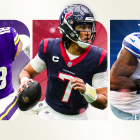Subscribe: via iTunes | via Stitcher | via TuneIn
It's been kind of easy to plug and play Calvin Ridley to the Bears as a top-10 pick in 2018 NFL Mock Drafts. He might be the best wideout in the draft class, the Bears want to build around Mitchell Trubisky and, uh, he comes from Alabama, following in the footsteps of Julio Jones and Amari Cooper. Those are reasons, if not good ones.
But maybe we should be rethinking our evaluation on Ridley. CBS Sports NFL Draft Writer Chris Trapasso certainly is, and when he joined the Pick Six Podcast (subscribe via links above) to break down his winners and losers from the 2018 NFL Combine, Trapasso made a really good case why teams should be worried about Ridley, pointing out that he's not a burner given his "slender frame" (6'1", 189 pounds) and that the metrics don't back up an impact wide receiver.
"[Ridley] ran a 4.43 [40-yard dash], which is good, but at that weight I was kind of expecting him to be a little faster," Trapasso explained. "He had a broad jump in the second percentile among wide receivers since 1999 at the combine. Second! And his vertical was in the seventh percentile, so, for someone who is apparently this super-quick, super-agile, make-you-miss type of player, those combine numbers don't really indicate that.
"One other note: Pro Football Focus only had him forcing two missed tackles last year, which is not a lot if you're going to be that make-you-miss, YAC [yards after catch] receiver. So, I didn't drop him into the fifth round. But he is, if you're going to pull and just look around the internet, a trendy pick to the Bears at No. 8. I just don't think you can pick someone who is that small, that lacks that explosiveness.
"And he's going to be 24 in his rookie year, so just not my kind of wide receiver."
Um, yikes. Speaking specifically to the metrics, Trapasso and I talked a lot about MockDraftable, a really helpful site that shows how potential NFL players slot out in terms of their measurables in a spider-web style chart. Check out Ridley's and tell me there aren't some red flags:

The summary? He runs kind of fast in a straight line. The three-cone drill isn't terrible but those jumping percentiles are a major concern, especially if you couple them with his lack of explosiveness with the ball in his hands.
This isn't trying to bury Ridley, it's just worth noting when considering the wideout as a prospect. Trapasso also details some other highlights and lowlights for various prospects.
Also joining the show was former NFL agent and CBS Sports salary cap expert Joel Corry, who took a deep dive into the various franchise tag situations around the NFL, including Le'Veon Bell, who was tagged again by the Pittsburgh Steelers.
Corry knows the ins-and-outs about the Steelers contracts and just doesn't see a path to a deal if Bell is going to demand a deal from yesteryear given the state of the running back market.
"Le'Veon Bell was born five years too late. He needed to be born when Adrian Peterson and Chris Johnson were making $13 and $14 million per year as running backs," Corry pointed out. "Right now the top long-term deal is Devonta Freeman at $8.25 million per year. 10 years ago, Steven Jackson signed a deal for more money than that! That tells you where the running back market has gone."
Jackson was a young stud running back in 2008, when he got a five-year extension worth $49.3 million with $21 million in guaranteed money. That money doesn't exist. Bell is almost better off taking the franchise tag at this point, save for the lack of long-term security.
"The franchise tag for running backs, unlike most positions, has no relation to the marketplace. So he's actually getting a windfall off of the tags," Corry said. "They offered him what I thought was a very fair deal last year, based on the market's decline. $12 million per year, $39-42 million in the first three years. Pittsburgh's deals are a little unique from the standpoint that they don't do traditional salary guarantees and he's not going to reinvent the wheel structurally. So if he wants to play in Pittsburgh long term it's that kind of structure."
Really hurting Bell's cause? It's hard to imagine having a healthier, better year than he did in 2017. It's possible the Steelers could even decide to just, as Corry suggested, run him into the ground and let him walk.
"The problem is he was healthy, went out and had a very good year, so his expectations aren't going to go down. Pittsburgh's been negotiating in earnest with him, which to me tells me they're willing to pay him more than $12 million per year. But at some point there's a walk away number to me," Corry said. "Personally I wouldn't do the deal with him, given where the running back market is. I would load him up with an NFL-record touches between his receptions and catches, draft somebody fairly early. Draft his replacement, as talented as he is, run him into the ground, and let somebody else pay for those years where he's going to have a lot of wear and tear and potentially diminishing returns when he's approaching 30."
Don't let anyone tell you the NFL isn't a business. We also touched on the fascinating wide receiver market and how Corry would approach a contract for Allen Robinson and Sammy Watkins in free agency, plus the future of Jarvis Landry.
Listen above or hit the subscribe button below for the full show.
Follow @WillBrinson on Twitter!
Subscribe: via iTunes | via Stitcher | via TuneIn


















